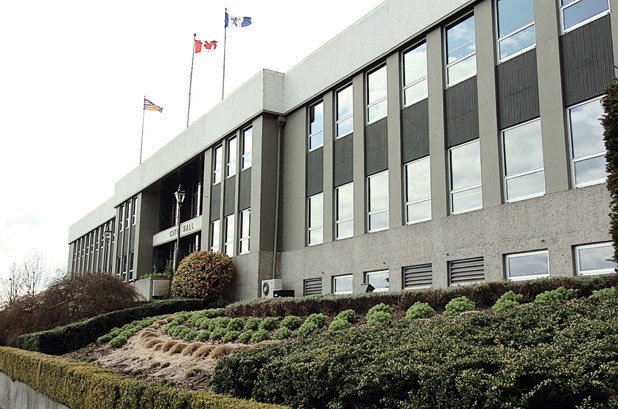Utility rates are rising in New West in 2025 – with next year's sewer rates reflecting costs associated with the “significant cost overrun” of the North Shore wastewater treatment plant.
At a Nov. 25 workshop, council considered staff recommendations related to proposed 2025 utility rates: electric – 3.5 per cent; water – six per cent; solid waste – 12 per cent; and sewer – 18 per cent. All totalled, the rates recommended by staff would have had a “blended rate” of 8.9 per cent.
Most of Monday’s two-hour-and-20-minute discussion on utility rates focused on next year’s sewer rates. The staff report included three scenarios for the sewer and drainage utility rate:
- Scenario 1 – 18 per cent in 2025, followed by eight per cent increases in 2026, 2027, 2028 and 2029. (This represents a $203 increase in the average household’s sewer utility bill.)
- Scenario 2 – eight per cent in 2025, followed by eight per cent increases in 2026, 2027, 2028 and 2029. (This represents a $90 increase in the average household’s sewer utility bill.)
- Scenario 3 – 10 per cent in 2025, followed by 10 per cent increases in 2026, 2027, 2028, and 2029. (This represents a $113 increase in the average household’s sewer utility bill.)
Shehzad Somji, the city’s director of finance, said the 18 per cent increase to sewer rates helps the City of New Westminster’s sewer rates stay in line with what had been proposed in the past. He said the rate would result in a onetime impact to residents, before going back to the eight per cent annual increases for 2025 to 2029 that had been previously supported by council.
“We do have old infrastructure,” he said. “We do need our reserve balances to be healthy enough to maintain that and to be able to do that replacement of infrastructure. That’s the main reason why staff are recommending the 18 per cent increase for 2025, and then reduce our rates back to eight per cent in 2026 to 2029.”
Prior to Monday’s workshop, Somji said staff had contacted other municipalities to find out what type of sewer rates they are proposing for 2025. He said several neighbouring cities are proposing rates higher than those recommended in New West, including: Burnaby – 20 per cent; Delta – 34.9 per cent; Port Moody – 29.5 per cent; Richmond – 33. 3 per cent; and Vancouver – 36.9 per cent.
While city staff had recommended an 18 per cent increase in 2025, council members agreed that scenario was too much for taxpayers. They were, however, divided on the other two scenarios.
Following a lengthy discussion, council voted 4-2 in support of the scenario calling for a 10 per cent increase annually from 2025 to 2029. Mayor Patrick Johnstone and councillors Ruby Campbell, Tasha Henderson and Jaimie McEvoy supported this option.
Johnstone said this scenario, helps address the “bit hit” being experienced because of the Metro Vancouver sewer project. He said it is more consistent with the city’s practice of trying to provide consistent rates through the years.
“It's not great but it's more predictable for folks, so I tend to lean towards the 10 per cent,” he said. “I think it balances that ability to provide some consistency to people and also to still maintain a strong reserve, and still continue to build that reserve for where we need it to be.”
McEvoy said community members understand that New Westminster has aging infrastructure and recognize the value of the city reserves and contingencies.
Fontaine said council was “heading in the right direction” by supporting a lower sewer rate increase than had been recommended by staff, but he did not feel it was low enough.
“I hear time and time again how people are struggling to make ends meet. They're struggling to put food on the table, struggling with their own job security. I mean, the list goes on and on,” he said. “And when I look at these rates that are proposed today … it just it astounds people at the rate of increase.”
According to a staff report, Metro Vancouver has increased its municipal levies by about $5.4 million (38.4 per cent) from $13.9 million in 2024 to $19.3 million in 2025 to compensate for significant cost overruns of the North Shore wastewater treatment plan project.
Fontaine said a “big chunk” of the increase is due to “mismanagement and misspending” at Metro Vancouver. Instead of the 10 per cent scenario, he would have preferred for council to support the eight per cent increase to the sewer rate.
“Even eight per cent … is still high,” he said. “Like we're talking three per cent inflation.”
The staff report stated the eight per cent increases over five years option represents “a material decrease” to the city’s projected 2028 sewer reserves balances and will delay the city’s ability to meet its “reserve to asset CRV ratio of five to 10 per cent” beyond 2029.
While the 10 per cent scenario reduces the previous year’s projected 2028 sewer reserve balance by $6.3 million, the report said the city would be able to achieve its reserve to asset CRV ration of five to 10 per cent by 2027.
In addition to voting 4-2 in favour of the 2025 utility rates (including the 10 per cent scenario for the sewer rate), council also voted 4-2 in support of the utility fund 2025 to 2029 capital plans and the 2025 utility fund and climate action team service enhancement requests.



